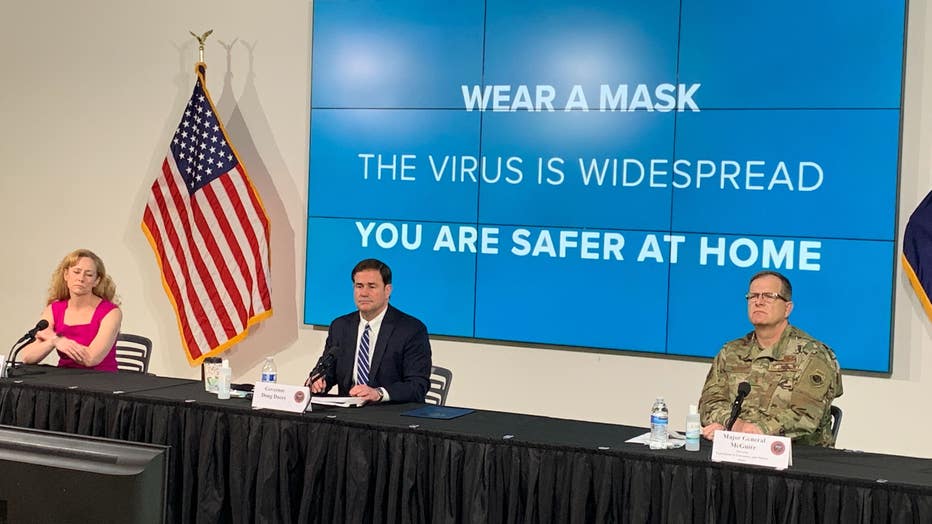Arizona has 89 new coronavirus deaths, but hospitalizations drop
PHOENIX - Arizona health officials reported 89 additional deaths from the coronavirus on July 24 as a rise in fatalities that began early in July shows no sign of easing.
The state Health Services Department said the new deaths bring the statewide tally since the first was reported in March to 3,142. The state reported 3,349 new cases, putting total confirmed cases at 156,301.
Hospitalizations for the virus have dropped significantly in the past two weeks, with 2,844 people being treated as of July 23. That’s down from the July 13 peak of 3,517 people. The number of people being cared for in intensive care units has also fallen significantly.
The decline was the first sustained drop in new cases since Gov. Doug Ducey imposed orders a month ago closing gyms, nightclubs and bars and face-mask orders issued by local governments started to appear. The Republican said on July 23 he would extend those closure orders indefinitely.
“There’s no victory lap today. There’s no celebration,” Ducey said at his weekly virus briefing. “We cannot let up –- we need to be vigilant every day in the state of Arizona.”

Ducey allowed local governments in June to impose requirements for face masks in public spaces, and 90% of the state’s population is now covered by those orders. Ducey pointed to the closure and mask orders as leading to a drop in new cases in the past two weeks for the first time in months.
The governor also pulled back on his earlier aim to have schools fully reopen by Aug. 17. He’s instead requiring them to provide in-person options for children who need a place to go or specialized instruction. The Health Services Department will develop a series of scientific guidelines school districts can use to determine when it is safe to fully reopen.
The number of actual infections in Arizona and elsewhere is thought to be much higher because many people have not been tested. Studies suggest people can be infected with the virus without feeling sick.
For most people, the new coronavirus causes mild or moderate symptoms, such as fever and cough that clear up in two to three weeks. For some, especially older adults and people with existing health problems, it can cause more severe illness, including pneumonia and death.
In order to protect yourself from a possible infection, the CDC recommends:
- Avoid close contact with people who are sick.
- Avoid touching your eyes, nose, and mouth.
- Stay home when you are sick.
- Cover your cough or sneeze with a tissue, then throw the tissue in the trash.
- Clean and disinfect frequently touched objects and surfaces using a regular household cleaning spray or wipe.
- Cover your mouth and nose with a cloth face cover when around others
- Wash your hands often with soap and water for at least 20 seconds, especially after going to the bathroom; before eating; and after blowing your nose, coughing, or sneezing.
- Monitor your health daily
MAP: Worldwide interactive Coronavirus case data
MAP: Arizona Coronavirus cases by zip code
FULL COVERAGE: fox10phoenix.com/coronavirus
CDC: How coronavirus spreads, symptoms, prevention, treatment, FAQ
Arizona COVID-19 resources, FAQ: azdhs.gov/coronavirus
On CoronavirusNOW.com, you'll find extensive coverage about COVID-19, including breaking news from around the country, exclusive interviews with health officials, and informative content from a variety of public health resources.
RELATED:
- Coronavirus in Arizona: Latest case numbers
- Coronavirus: Symptoms, testing and how to prepare amid growing COVID-19 outbreak
- How coronavirus differs from flu: Symptoms to watch for
Symptoms for coronavirus COVID-19 include fever, coughing, and shortness of breath. These, of course, are similar to the common cold and flu.
Expect a common cold to start out with a sore or scratchy throat, cough, runny and/or stuffy nose. Flu symptoms are more intense and usually come on suddenly, and can include a high fever.
Symptoms of COVID-19 may appear more slowly. They usually include fever, a dry cough and noticeable shortness of breath, according to the World Health Organization. A minority of cases develop pneumonia, and the disease is especially worrisome for the elderly and those with other medical problems such as high blood pressure, obesity, diabetes or heart conditions.
RELATED: Is it the flu, a cold or COVID-19? Different viruses present similar symptoms
Right now there's one big difference between flu and coronavirus: A vaccine exists to help prevent the flu and it's not too late to get it. It won't protect you from catching the coronavirus, but may put you in a better position to fight it.
To protect yourself, wash your hands well and often, keep them away from your face, and avoid crowds and standing close to people.
And if you do find yourself showing any of these flu or coronavirus symptoms - don't go straight to your doctor's office. That just risks making more people sick, officials urge. Call ahead, and ask if you need to be seen and where.
Get breaking news alerts in the FOX 10 News app. It is FREE! Download for Apple iOS or Android.


